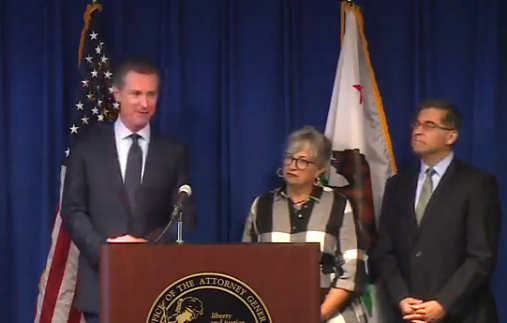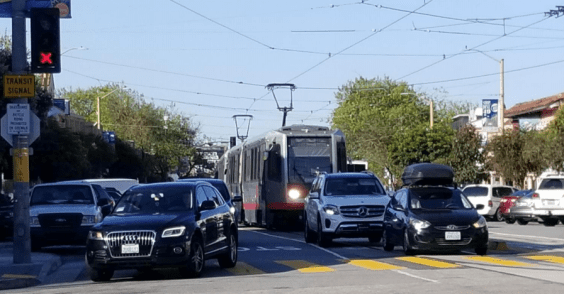It hasn't even been officially announced, but the federal EPA is expected to revoke California's authority to set standards for greenhouse gas emissions from vehicles today, while Trump is in the state raising money for his reelection campaign.
At a press conference this morning, California leaders made it clear they have no intention of giving up the state's regulatory authority. Governor Gavin Newsom, State Attorney General Xavier Becerra, and Air Resources Board Chair Mary Nichols discussed what they know about the move by the federal government.
California's authority comes from a federal waiver granted because California's work on clean air rules predated the Federal Clean Air Act. The federal government is attacking California's authority on several fronts; CALmatters published an explainer of the ins and outs here.
The current threat, according to tweets from Trump, is to take away California's right to regulate greenhouse gas emissions from vehicles, which the federal government has argued is not the same as regulating pollution.
"What we're seeing is that they're going to say we can't set rules about climate change," said ARB Chair Nichols. "That issue has been litigated twice now, and California has won each time. But more importantly, on a factual basis, you can't separate the two things," she added. That is, emissions that contribute to smog and health problems - which are regulated under the Clean Air Act - are connected to the greenhouse gas emissions that are changing the climate. The sources of emissions are the same.
And vehicles are a major source of both kinds of emissions.
“The standards that we are in the process of enforcing are necessary to protect the public health and welfare. Not just because we care about the future of the planet," said Nichols. "We need these extra clean cars in order to meet the health standards set by the federal government that we violate now on a regular basis throughout Southern California and the San Joaquin Valley.”
"If this ruling were to prevail, millions of people in California and other states will be breathing dirtier air. They will suffer more asthma, more hospitalizations, and more deaths."
According to Attorney General Becerra, Trump lacks the authority to revoke the waiver anyway. "He's going about it the wrong way, and we believe this action won't stand. There is a due process under which our governments must act."
California is "going to do what we must to protect the rights we’ve had for seventy years."
Governor Newsom stressed the importance of California's stance. "This is a pivotal moment in the history of the fight against climate change," he said. "You can't get serious about climate change unless you get serious about vehicle emissions."
The Governor also called the threatened federal action "a solution in search of a problem."
"Who is this for?" he asked. "The automakers don't want it. It's about the oil industry, period, full stop. It's not about carmakers, it's not about the environment, it's not about health."
"The oil industry has wanted to get rid of this waiver for years," he said. "It predates Trump; it's just one of many examples of their relationship."
He warned that loosening the standards would further U.S. dependence on foreign oil and a fossil fuel industry "which is coming to an end."
"California wants to make sure we are on the right sight of this moment," he said. "We will prevail."
Newsom also addressed the precarious position of automakers, including the four that have already agreed to abide by California standards.
"Make no mistake: they were directly threatened by Trump" when he launched an antitrust investigation into that agreement, he said.
"That's the state of America in 2019. It's a remarkable statement by itself, that a U.S. President is threatening industry."
Other auto companies that have been considering joining the agreement are also in a tight spot. "These companies have to make a decision very soon," he added. "They have to make commitments now for future fleets: are they going to voluntarily agree to higher standards, or wait for years and years of uncertainty?"
Judging from the length of past cases on the subject, litigation is likely to take years, and could easily not see a resolution until after Trump is long gone from office.
Trump has claimed that California's standards are making vehicles too expensive, and that lowering standards will make it easier for people to buy cars. Becerra warned the media at the press conference to "check the facts when they say it will be cheaper."
"If the arguments in those tweets are the arguments they're going to make," he said, "We'd love to see them in court. They can't find a way to square the facts and science."
California is also considering applying pressure in other ways. It has floated the idea of limiting consumer rebates for buying electric vehicles to cars made by auto manufacturers that have agreed to California standards.
Newsom hinted that there might be an announcement later this week on the topic.





